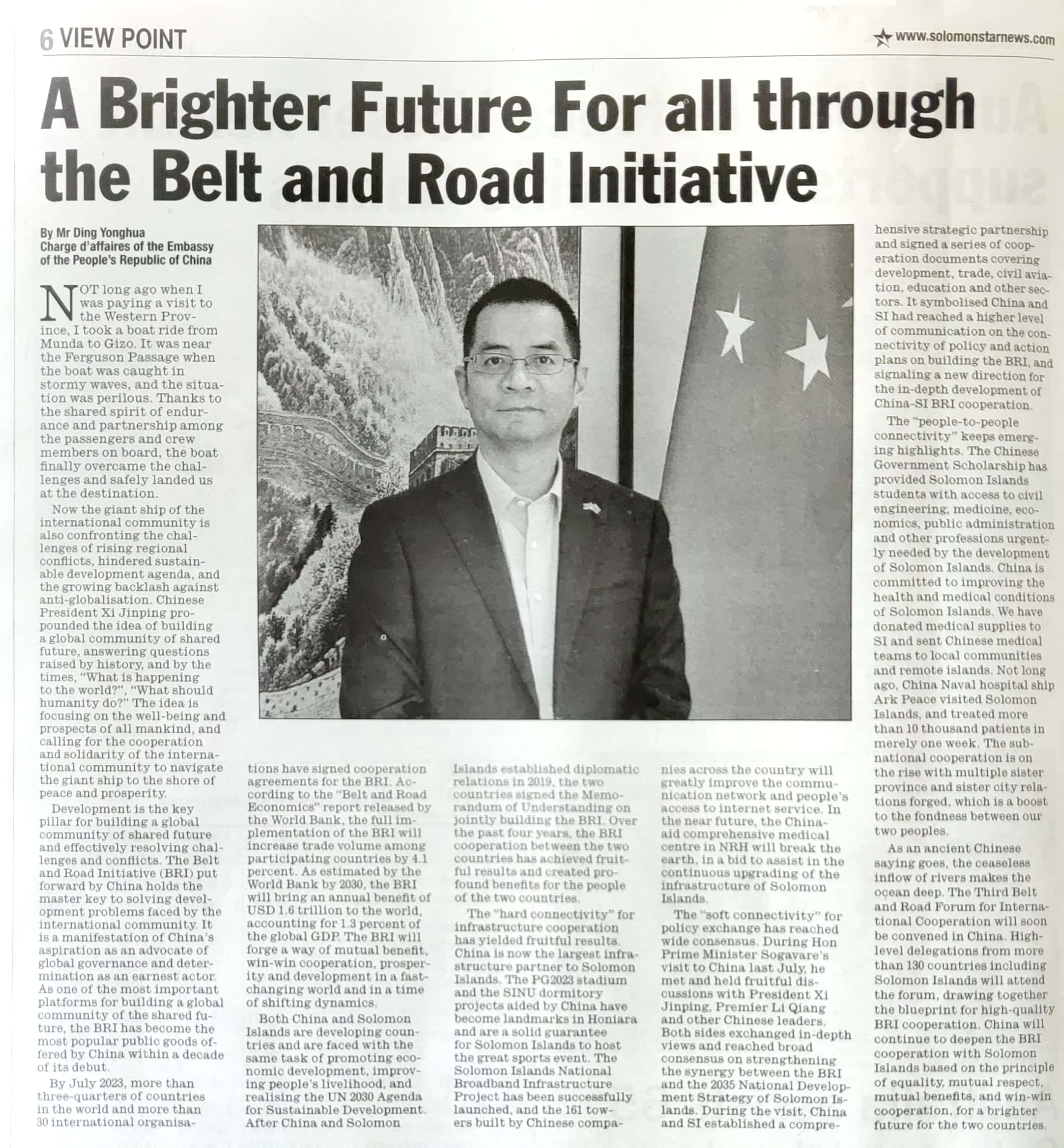October 18, the local meida The Island Sun and Solomon Star published a signed article by Ding Yonghua, Charge d 'affaires of the Embassy of the People's Republic of China to Solomon Islands, entitled "A Brighter Future Through the Belt and Road Initiative". The full text is as follows:

Not long ago when I was paying a visit to the Western Province, I took a boat ride from Munda to Gizo. It was near the Ferguson Passage when the boat was caught in stormy waves, and the situation was perilous. Thanks to the shared spirit of endurance and partnership among the passengers and crew members on-board, the boat finally overcome the challenges and safely landed us to the destination.
Now the giant ship of international community is also confronting the challenges of rising regional conflicts, hindered sustainable development and the growing backlash against anti-globalization. Chinese President Xi Jinping propounded the idea of building a global community of shared future, answering a question raised by history, and by the times, "What is happening to the world? What should humanity do?" The idea is focusing on the well-being and prospects of all mankind, and calling for the cooperation and solidarity of the international community to navigate the giant ship to the shore of peace and prosperity.
Development is the key pillar for building a global community of shared future, and effectively resolving the challenges and conflicts. The Belt and Road Initiative put forward by China holds the master key to solving all problems faced by the international community. It is a manifestation of China’s aspiration as an advocate of global governance and determination as an earnest actor. As one of the most important platforms for building a global community of shared future, the Belt and Road Initiative has become the most popular public goods offered by China within a decade of its debut.
By July 2023, more than three-quarters of the world's countries and more than 30 international organizations have signed the BRI cooperation documents. According to the "Belt and Road Economics" report released by the World Bank, the full implementation of the BRI will increase trade between participating countries by 4.1%. As of 2030, the initiative will produce US$1.6 trillion in benefits for the world every year, accounting for 1.3% of the global GDP. The BRI will forge a way of mutual benefit, win-win cooperation, prosperity and development for this chaotic and intertwined world.
Both China and Solomon Islands are developing countries and faced with the task of promoting economic development, improving people's lives, and realizing the 2030 Agenda for Sustainable Development. After China and Solomon Islands established diplomatic relations in 2019, the two countries signed a memorandum of understanding on jointly building the BRI. Over the past four years, the cooperation between the two countries under the BRI has achieved fruitful results and created profound benefits for the people of the two countries.
The "hard connectivity" for the infrastructure cooperation between the two countries have been fruitful. China now has become the largest infrastructure partner of Solomon Islands. The main stadium for PG2023 and the dormitory of the SINU aided by China have become landmarks in Honiara, providing important guarantees for Solomon Islands in hosting large-scale sports events. The Solomon Islands National Broadband Infrastructure Project has successfully started, and will build 161 signal base stations throughout whole countries, which will greatly improve the communication network and conditions of Solomon Islands. In the near future, the national referral hospital comprehensive medical center and other projects aided by China will gradually come into force, and to promote the infrastructure of Solomon Islands of continuous upgrading.
The "soft connectivity" for policy exchange between the two countries have reached wide consensus. In July of this year, Prime Minister Sogavare led a delegation to China, President Xi Jinping, Premier Li Qiang and other Chinese leaders met and talked with Prime Minister Sogavare, exchanged in-depth views and reached broad consensus on strengthening the synergy between the BRI and the 2035 development strategy of Solomon Islands. During the visit, the two countries established a comprehensive strategic partnership and signed a series of cooperation documents in trade, civil aviation, education etc. It signifies the two sides have reached a higher level of communication on building the BRI in various fields and points to a new direction for the in-depth development of concrete cooperation between China-SI in the next stage.
The "people-to-people connectivity" between the two countries keep emerging highlights. Chinese Government Scholarship has provided Solomon Islands students with access to civil engineering, medicine, economics, public administration and other professions urgently needed by the development of Solomon Islands. China is committed to improving the health and medical conditions of Solomon Islands. We have repeatedly donated medical supplies to SI and sent Chinese medical teams to local communities and remote islands. Not long ago, China Naval hospital ship Ark Peace visited Solomon Islands, having treated more than 10 thousands patients in merely one week. The sub-national cooperation is on the rise with multiple sister province and sister city relations forged, which is a boost to the fondness between our two peoples.
As an ancient Chinese saying goes, ceaseless inflow of rivers makes the ocean deep. The Third Belt and Road Forum for International Cooperation will be convened in China soon. High-level delegations from more than 130 countries including Solomon Islands will attend the forum, drawing together the blueprint for the high-quality BRI cooperation. China will continue to deepen the BRI cooperation with Solomon Islands based on the principle of equality, mutual respect, mutual benefits, and win-win cooperation, for a brighter future for the two countries.

 中文
中文 English
English